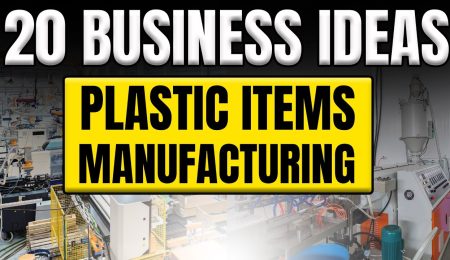Starting a plastic products manufacturing business can be an exciting and profitable venture. If you’ve ever dreamt of turning your innovative ideas into tangible products, this guide will provide you with essential steps to embark on this entrepreneurial journey. Let’s explore the key steps to start a plastic products manufacturing business in India.
1. Market Scope
Understanding the Market: Before diving into the plastic products manufacturing business, it is crucial to understand the market scope. Conduct thorough market research to identify the demand for various plastic products. This includes assessing the needs of industries such as packaging, automotive, construction, healthcare, and consumer goods.
Key Considerations:
- Identify target markets and potential customers.
- Analyze competitors and their product offerings.
- Evaluate market trends and growth potential.
- Determine the specific niche you want to focus on (e.g., plastic containers, automotive parts, medical devices).
2. Get Training
Importance of Training: Gaining knowledge and expertise in plastic manufacturing processes is vital for running a successful business. Consider enrolling in relevant training programs or courses to understand the technical aspects and industry best practices.
Training Resources:
- Technical institutes offering courses in plastic technology.
- Workshops and seminars conducted by industry experts.
- Online courses and certifications from reputable platforms.
- Practical experience through internships or apprenticeships in established plastic manufacturing units.
3. Business Investment
Financial Planning: Starting a plastic products manufacturing business requires substantial investment. Create a detailed business plan outlining the capital required for various aspects, including machinery, raw materials, labor, and operational expenses.
Sources of Funding:
- Personal savings or funds from family and friends.
- Business loans from banks or financial institutions.
- Government grants and subsidies for small and medium enterprises (SMEs).
- Venture capital or angel investors interested in manufacturing startups.
4. Licenses for Business
Regulatory Compliance: Ensure that your business complies with all legal and regulatory requirements. Obtain the necessary licenses and permits to operate a plastic manufacturing unit.
Required Licenses:
- Business Registration: Register your business entity (sole proprietorship, partnership, LLP, or private limited company) with the Registrar of Companies (ROC).
- Pollution Control Board Certificate: Obtain consent from the State Pollution Control Board to ensure environmental compliance.
- Factory License: Register your manufacturing unit with the local labor department and obtain a factory license.
- GST Registration: Register for Goods and Services Tax (GST) to comply with tax regulations.
- BIS Certification: Obtain Bureau of Indian Standards (BIS) certification for specific plastic products, if applicable.
5. Location and Space for Manufacturing (Business)
Selecting the Right Location: Choosing an appropriate location for your manufacturing unit is critical. Consider factors such as proximity to raw material suppliers, transportation facilities, and availability of skilled labor.
Space Requirements:
- Manufacturing Area: Ensure sufficient space for installing machinery and equipment.
- Storage Area: Allocate space for storing raw materials and finished products.
- Office Space: Set up administrative and managerial offices within the manufacturing premises.
- Safety Measures: Implement necessary safety measures and ensure compliance with workplace safety regulations.
6. Raw Materials
Sourcing Raw Materials: Identify reliable suppliers for high-quality raw materials required for plastic manufacturing. The choice of raw materials depends on the type of plastic products you plan to produce.
Common Raw Materials:
- Polyethylene (PE)
- Polypropylene (PP)
- Polyvinyl Chloride (PVC)
- Acrylonitrile Butadiene Styrene (ABS)
- High-Density Polyethylene (HDPE)
- Low-Density Polyethylene (LDPE)
Quality Control: Establish quality control measures to ensure the consistency and reliability of raw materials. This will help maintain the quality of your final products.
7. Production Machines
Machinery and Equipment: Invest in the right machinery and equipment for your plastic products manufacturing unit. The choice of machines depends on the type of products you plan to produce.
Common Machines:
- Injection Molding Machine: For producing plastic parts and components.
- Extrusion Machine: For creating plastic sheets, pipes, and profiles.
- Blow Molding Machine: For manufacturing plastic bottles and containers.
- Thermoforming Machine: For producing plastic trays, cups, and packaging.
- Rotational Molding Machine: For making hollow plastic products like tanks and containers.
Maintenance and Upkeep: Regular maintenance and upkeep of machinery are essential to ensure smooth production processes and minimize downtime.
8. Manufacturing Process
Step-by-Step Production: Understand and implement the step-by-step manufacturing process for your chosen plastic products. The process may vary depending on the type of product and manufacturing technique.
General Manufacturing Steps:
- Design and Prototyping: Create product designs and prototypes.
- Raw Material Preparation: Prepare and process raw materials.
- Molding or Forming: Use appropriate machines to mold or form the plastic products.
- Cooling and Solidifying: Allow the products to cool and solidify in the desired shape.
- Trimming and Finishing: Trim excess material and finish the products as required.
- Quality Inspection: Conduct thorough quality checks to ensure product standards.
- Packaging: Package the finished products for distribution.
9. Marketing Tips
Promoting Your Business: Effective marketing strategies are crucial for the success of your plastic products manufacturing business. Focus on creating a strong brand presence and reaching out to potential customers.
Marketing Strategies:
- Online Presence: Create a professional website and leverage social media platforms to showcase your products.
- Networking: Attend industry trade shows, exhibitions, and conferences to network with potential clients and partners.
- Direct Sales: Establish a direct sales team to approach businesses and distributors.
- Advertising: Use digital and traditional advertising methods to promote your products.
- Customer Service: Provide excellent customer service to build long-term relationships with clients.
Starting a plastic products manufacturing business involves careful planning, investment, and execution. By following these steps, you can establish a successful business that meets market demands and delivers high-quality plastic products. Remember to stay updated with industry trends and continuously improve your processes to stay competitive in the market. With determination and the right strategies, you can turn your plastic product dreams into reality.
Supplier or Manufacturer from India? Register FREE and List Your products





Leave feedback about this